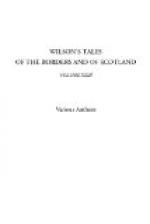“Weel,” replied she, smiling, “it would just seem that even the haggis has not pleased you, Mr. Dallas;” and, putting her hand into a big side-pocket, that might have served a gaberlunzie for a wallet, she extracted a small piece of paper. She continued: “But ye see a guid, honest Scotchwoman’s no to be suspected of being shabby at her own table; so read ye that, which you may take for the bread-pudding.”
And the writer, having taken the paper, and held it before his face for so long a time that it might have suggested the suspicion that the words therein written stuck in his eyes, and would not submit to that strange process whereby, unknown to ourselves, we transfer written vocables to the ear before we can understand them, turned a look upon the woman of dark suspicion—
“Where, in God’s name, got you this?” he said.
“Just read it out first,” replied she. “Ye read yer ain paper, and why no mine?”
And the writer read, perhaps more easily than he could understand, the strange words:
“This child, born of my wife, and yet neither of my blood nor my lineage, I repudiate, and, unable to push it back into the dark world of nothing from which it came, I leave it with a scowl to the mercy which countervaileth the terrible decree whereby the sins of the parent shall be visited on the child. This I do on the 15th of June 17—. JOHN NAPIER of Eastleys, in the county of Mid-Lothian.”
After reading this extraordinary denunciation, Mr. Dallas sat and considered, as if at a loss what to say; but whether it was that scepticism was at the root of his thoughts, or that he assumed it as a mask to conceal misgivings to which he did not like to confess, he put a question:
“Where got you this notable piece of evidence?”
“Ay,” replied Mrs. Hislop, “you are getting reasonable on the last dish. That bit of paper, which to me and my dear Henney is werth the haill estate of Eastleys, was found by me carefully pinned to the flannel in which the child was wrapt.”
“Wonderful enough surely,” repeated he, “if true”—the latter words being pronounced with emphasis which made the rough liquid letter sound like a hurling stone; “but,” he continued, “the whole document, in its terms of crimination and exposure, and not less the wild manner of its application, is so unlike the act of a man not absolutely frantic, that I cannot believe it to be genuine.”
“But you know, Mr. Dallas,” replied she, “that Mr. John Napier was a man who, if he threw a stone, cared little whether it struck the kirk window or the mill door.”
“That is so far true; but, passionate and unforgiving as he was, he was not so reckless as to be regardless whether the stone did not come back on his own head.”
“And it’s no genuine!” she resumed, as, disregarding his latter words, she relapsed into her more familiar dialect. “The Lord help ye! canna ye look at first the ae paper and then the ither? and if they’re no alike, mustna the ither be the forgery?”




